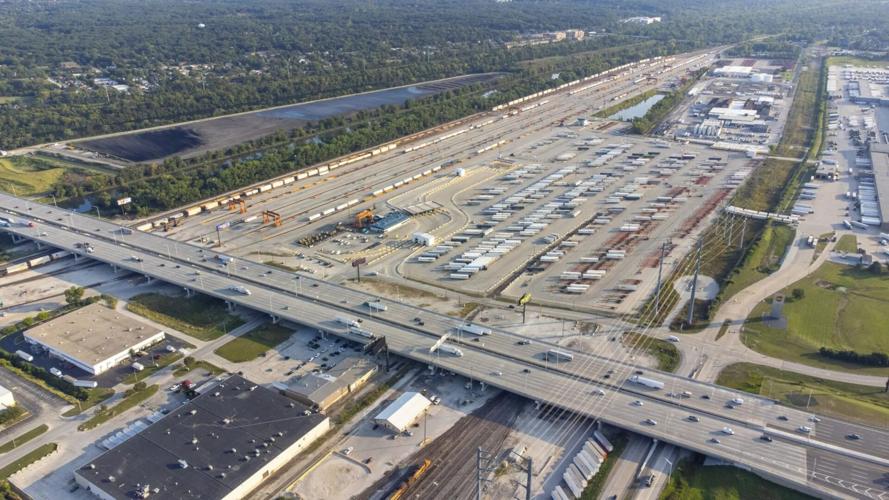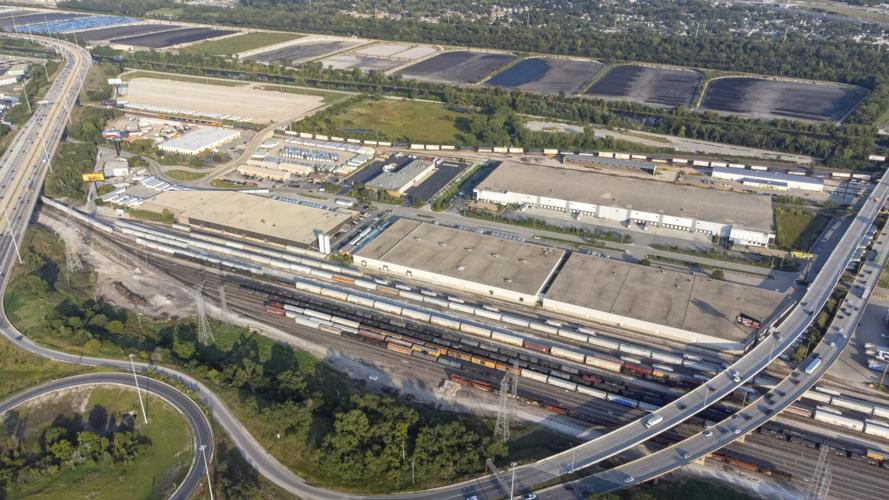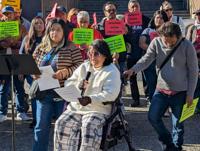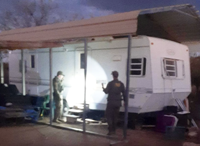
David Huerta in the Little Village neighborhood of Chicago, near his home, on Sept. 18, 2025. photo by Carlos Baez for Investigate Midwest
This story is supported by funding from the Chicago Region Food Systems Fund.
Each day before sunrise, David Huerta checks his rearview mirror for immigration enforcement agents as he drives through the dark to a warehouse in a southwest Chicago suburb. Once he’s clocked in, he peers periodically through the windows on the truck dock, making sure ICE isn’t there. For hours this will go on, as he unloads pallets heavy with sacks of flour and salt, bound for grocery stores nationwide.
When trucks pull into the dock, Huerta readies his forklift to begin unloading the pallets, but first, he must interact with the drivers.
Most are professional while filling out the required paperwork. However, some of the drivers harass him, behavior that has increased since President Trump took office in January.
“The most degrading thing is when the drivers arrive with their MAGA caps and they ask, ‘Hey, when are you going back to Mexico?’ ” said Huerta, who works for a company that makes baking mixes and nutritional powders. “ ‘Soon, don’t worry about it.’ That’s the only answer you give, because you can’t say more, because you don’t know if when you close the door, they’ll make a call and say, ‘Hey, there’s some Mexicans in here.’ ”
Huerta is one of the 68,000 workers in the Chicago region’s food and beverage manufacturing sector, according to a 2023 report from World Business Chicago, an economic development agency. Warehouses operated by some of the nation’s largest food brands accept raw products from farms that are processed and mixed into edible goods, boxed, packaged and shipped to grocery stores and restaurants nationwide.
The labor force of forklift drivers, box packers, mixers and inspectors that has helped turn Chicago into a global logistical hub is largely fueled by immigrants with varying legal statuses.
For decades, those jobs have often been difficult and sometimes unsafe, with undocumented workers having little recourse when their rights were violated. In recent years, worker advocates have said that state and federal policies have made progress in protecting vulnerable immigrants who anchor the region’s growing food logistics industry.
But now, the Trump administration’s anti-immigration policies have revived fears that recent gains are unraveling and the stability of the region’s food system will be shaken. Trump has ended deportation deferral programs, increased workplace raids and sued the state of Illinois over some of its labor laws.
Most notably, Trump terminated a Biden-era program called Deferred Action for Labor Enforcement, or DALE, which allowed undocumented workers who spoke out about labor violations to apply for a four-year work permit, essentially removing the threat of deportation.

David Huerta received a work permit through the Deferred Action for Labor Enforcement program. photo by Carlos Baez for Investigate Midwest
Huerta was granted a permit through DALE in 2024.
He and dozens of other undocumented temp workers made formal complaints against their employer, a third-party food logistics company with several locations throughout the Chicago area. The workers alleged that management discriminated by giving them heavy or dangerous jobs that the company knew they couldn’t refuse because of their immigration status. As a result, Huerta was granted a temporary work permit and was able to switch jobs.
“It turns out that the mistreatment, the distinction between full-time workers and temp workers is quite significant, because full-time workers are not usually given jobs that are as heavy as those given to agency workers,” Huerta said.
Huerta feels vulnerable, even though he is, for the first time in 26 years, able to work legally in the U.S.
“It’s true that right now, I have my work permit, but it’s the same thing, you’re still undocumented, you’re still the one who has no say,” said Huerta, whose temporary work permit does not provide a path to citizenship.
To better understand how Trump’s immigration policies are reshaping Chicago and its role in the national food system, Investigate Midwest spoke with dozens of warehouse workers, food manufacturers, immigrant advocates, lawmakers and neighborhood leaders.
The increase in workplace raids across the country has made many too afraid to show up for work.
Companies have laid off hundreds of people after Trump revoked some work permit programs. In suburban Schaumburg, more than 500 people were laid off in April from Nestlé USA’s Nation Pizza, the maker of DiGiorno and other popular frozen pizza brands.

Industrial areas where migrant labor is used near Chicago, on Sept. 18, 2025. photo by Carlos Baez for Investigate Midwest
The end of DALE underscores a broader shift. Once seen as a tool to encourage workers to come forward about labor violations, its cancellation signals the administration’s possible intent to not investigate workplace violations.
“The climate of uncertainty that has been created here, I think it’s particularly punitive, and it is affecting the food supply chain,” said Nik Theodore, a professor of urban planning and policy at the University of Illinois Chicago. “There are wide-ranging impacts here, in very uncertain times.”
Temp work, exploitation and the fight for protections
Even before the first non-Indigenous settlers arrived in the Chicago area, the land between the Upper Mississippi River System and the Great Lakes was a confluence of trade.
Over the past 170 years, the addition of railroads, river ports, major highways and airports has turned Chicago into one of the largest logistics hubs on the continent.
As the region’s manufacturing sector declined in the 1970s, the area leaned into its logistics industry, which became “an economic fix,” according to José Miguel Acosta-Córdova, an economic geographer and historian.
“There was a large area of land available for purchase for development west of the city, and you had eager governments,” Acosta-Córdova said of the collar counties, a five-county region west of Chicago. “There’s the need to move goods efficiently and rapidly around the world, and the need to store those goods as they were moving, right? So then the ’80s and ’90s and onwards, you see this huge logistics boom started happening.”
As massive warehouses were built, thousands of new jobs were created.
Over the last century, America’s agriculture and food production industries — including meatpacking plants, corn fields and industrial animal farms — have increasingly relied on immigrant labor as a way to maintain low pay and substandard working conditions.
With few other options, some of the immigrants who have flocked to jobs at Chicago’s food warehouses told Investigate Midwest they are forced to deal with demanding quotas and unsafe conditions.
“I came to this country with the American dream,” said Ricardo César González-Valentína, a warehouse worker from Mexico City. “But [abuse] begins to take away a piece of your life, of your body. You come here to work, you don’t come to do bad things. When I get to know the warehouses, it’s work that sustains the country, because that’s truly what we do. Contributing our part so that every American, from every country, can be fed. It has to pass through working hands. And those hands are mostly Latinos, from the moment a seed is harvested, from the moment it is planted, it blossoms, and the fruit emerges.”
While roughly 42% of farm workers are undocumented, less is known about how many undocumented people work in food manufacturing because it’s not tracked by a federal agency.
“This is a number that’s kind of difficult to put your finger on,” said Theodore, the UIC professor. “What we do know is that these workers are the backbone of the food system in Illinois and nationwide.”

Around 68,000 people work in the Chicago region’s food and beverage manufacturing sector, which is largely concentrated in the southwestern part of the city and the western suburbs. photo by Carlos Baez for Investigate Midwest
Even before Trump’s second term, the food supply chain struggled to find enough workers, but in recent months, farms, meatpacking plants and warehouses have reported a rise in labor shortages. The work can be physically demanding and repetitive, and the pay is low. Huerta is paid $18 an hour to drive a forklift all day.
Theodore believes Trump’s mass deportations will worsen the problem.
“Labor markets are not going to just seamlessly adjust without friction,” Theodore said. “I don’t think that there is a waiting workforce that is hoping to be employed by food processing plants. And this applies both to the city of Chicago, the collar counties, the rest of Illinois, and the major food manufacturing belts in Nebraska, in Iowa and elsewhere.”
Many individuals employed in the food distribution and processing industries are hired by temporary staffing agencies that often do not provide a clear pathway to full-time employment. This arrangement creates a “permatemp” workforce that critics say traps people in low-paying and sometimes hazardous jobs for decades.
González-Valentína, the warehouse worker from Mexico City, received a work permit through the DALE program before Trump took office. He described the food logistics company he previously worked for as “a mafia.”
“They fire people every six months. The company won’t let you have seniority because it doesn’t want to give benefits,” he said. “When we were there, they fired people every six months and still had the nerve to hire another 100 people.”
Worker centers in and around Chicago have attempted to advocate for better pay and benefits, increased safety and more job security. But the decks are stacked against temp workers, according to Maria Alfaro, an organizer with Warehouse Workers for Justice.
“If [a higher up] doesn’t like you, they’ll give the harder spots to the people that don’t have status, because they know that they need the job. And if they complain, they can get rid of them,” Alfaro said.
“That’s where people are getting hurt. People are getting hernias. People are getting their hands messed up with rotary tears because of the weight that they have to carry. And some of these people are women, you know, puny women that are carrying 50-pound bags. I don’t know how they do it all day.”
State lawmakers push for worker protections
In recent years, Illinois lawmakers enacted measures enshrining public education rights for children of undocumented parents, approved driver’s licenses for noncitizens, and restricted state and local law enforcement from cooperating with federal immigration enforcement.
Legislators also required employers to notify workers within five business days when federal authorities flag discrepancies in their E-Verify — the voluntary federal system that verifies worker eligibility — or I-9 employment forms. An I-9 audit means that ICE or the Homeland Security Investigations (HSI) division within ICE may do an on-site investigation of a worksite. A raid is different in that it won’t be announced. The law also prohibits employers from screening job applicants through E-Verify before hiring.
In May, the U.S. Department of Justice sued the state of Illinois, arguing that its state law interferes with immigration enforcement. A federal judge in Chicago dismissed that lawsuit in August.
This past legislative session, lawmakers also nearly passed amendments to the Privacy in the Workplace Act, which would have allowed worker centers and workers, regardless of their immigration status, to sue employers for violating their rights. The proposal was a response to the Trump administration’s funding cuts to federal labor enforcement.
Those funding cuts could put more pressure on states to investigate worker violations, but Illinois is facing its own funding challenges.
“The state is in financial straits,” said State Rep. Edgar Gonzalez, a Chicago Democrat and a co-sponsor of the bill, who said the proposal will be brought back in November. “And we don’t want to impose too much on the attorney general’s office, or anybody who would need to enforce this. Allowing the interested party [to sue] allows them to go through other mechanisms in order to seek remediation.”
One of the most significant improvements for undocumented workers prior to the second Trump administration came with the federal DALE program, which allowed undocumented workers to avoid deportation if they had credible information about a workplace violation.
Before DALE, a complaint could mean losing a job.
“Complaining means they tell you they don’t need you anymore,” said Huerta, the worker from Puebla.
DALE gave labor agencies access to workers and victims when investigating a potential case of child labor violations or a preventable fatality.
“It made doing their work a bit easier,” said Ann Garcia, a senior staff attorney with the National Immigration Project, a Washington, D.C.-based nonprofit. “Investigators could look into [reports] and not lose out on potential witnesses who otherwise wouldn’t have been there.”
However, Trump ended DALE soon after becoming president, a move first reported by Bloomberg Law.
Although only about 7,700 people had been granted DALE status by late 2024 (a fraction of the undocumented workforce), its end has had a ripple effect: Worker centers and community groups told Bloomberg they stopped filing applications altogether, fearing immigration authorities could use the personal information.

Illinois State Rep. Edger Gonzalez in his office in the Chicago neighborhood of Little Village on Sept. 24, 2025. photo by Jennifer Bamberg, Investigate Midwest
U.S. Citizenship and Immigration Services, which processed DALE applications, did not respond to questions from Investigate Midwest.
“Unfortunately, we’re kind of back to a situation today where neither of these agencies can do their work adequately,” Garcia said. “There’s really no possibility at this point of getting this kind of relief.”
Garcia believes DALE could make a comeback, though, with the next administration in 2029.
“I am hopeful that if we get a change in an administration that’s more positive, then we might be able to pick up from where we left off,” she said. “We were just getting started building trust and getting the word out.”
Fear of ICE shapes life inside Chicago’s warehouses
For many warehouse workers, the greatest fear is an ICE raid.
Chicago has been a focal point for the Department of Homeland Security, but federal agents have focused mostly on street arrests, using traffic checkpoints or entering public parks.
Workplace raids have been rare, but there’s worry from both employers and employees.
Some workers, who did not want their names published for fear of deportation, said they worry each time they leave for work. “I think we all worry about whether we’re going to come back or not,” said a mother of two from Mexico.
Brenda Palomares, a worker from the Mexican state of Guerrero, said the fear in her community reminds her of the shelter-in-place rules during the start of the COVID-19 pandemic.
“I think that this year, this year in particular, will be a year that no one will ever forget,” Palomares said. “It will go down in history, just like the pandemic. Right now, we’re in another pandemic, but it’s Trump’s pandemic, because they are tearing so many families apart.”
Since Trump took office, several food processing and warehouse businesses have reached out to local worker centers to ask how they should handle a raid.
“We’re normally training workers and fighting the boss, but now we’re helping to train bosses how (to) protect your workers,” said Shelly Ruzicka, communications and finance director for ARISE, an advocacy group for temporary workers.
Kevin Amaro from Illinois Workers in Action, a Chicago-based worker center, said that preparing for an ICE raid is a lot like conducting a fire drill. It involves educating management about what their rights are and what to do if ICE comes to their facility, because “a lot of employers are scared, too.”
“We have a checklist…we really work with companies to strategize and figure out this plan,” Amaro said. “ I mean real training, not just ‘here’s a 10-minute talk. Here’s a flyer.’ Great. You ready? No, like an actual in-depth, 40 minutes or more, check-in and plan.”
He emphasized the importance of not volunteering information beyond what’s legally required, and understanding the difference between audits, E-Verify checks and raids.
“There’s rights for everyone,” he said, “no matter your immigration status.”



















(0) comments
Welcome to the discussion.
Log In
Keep it Clean. Please avoid obscene, vulgar, lewd, racist or sexually-oriented language.
PLEASE TURN OFF YOUR CAPS LOCK.
Don't Threaten. Threats of harming another person will not be tolerated.
Be Truthful. Don't knowingly lie about anyone or anything.
Be Nice. No racism, sexism or any sort of -ism that is degrading to another person.
Be Proactive. Use the 'Report' link on each comment to let us know of abusive posts.
Share with Us. We'd love to hear eyewitness accounts, the history behind an article.